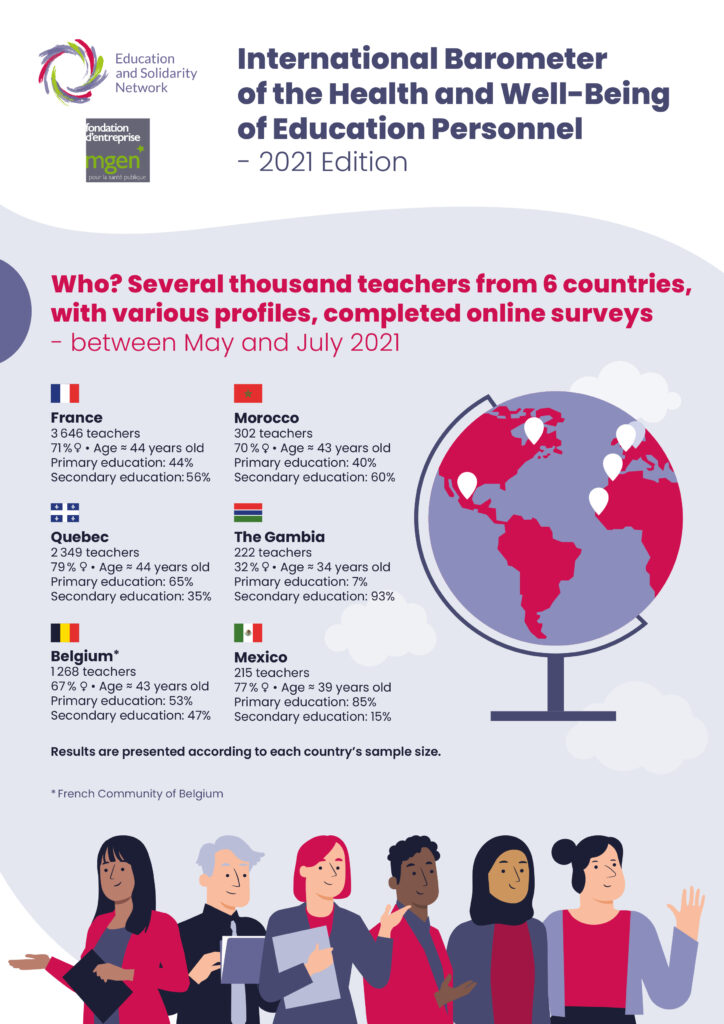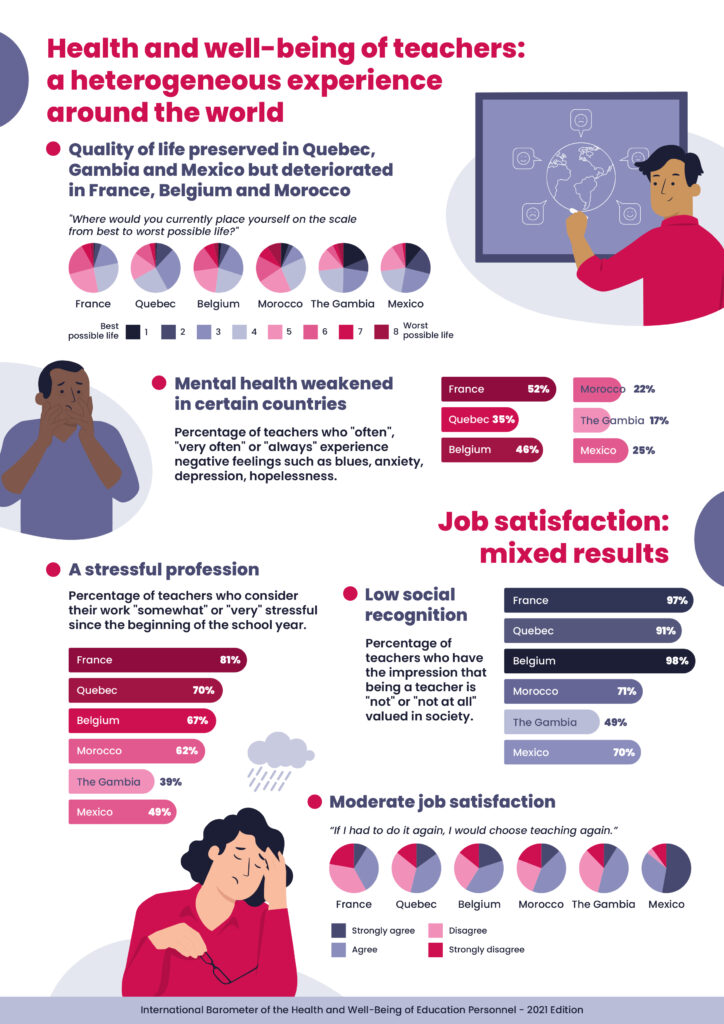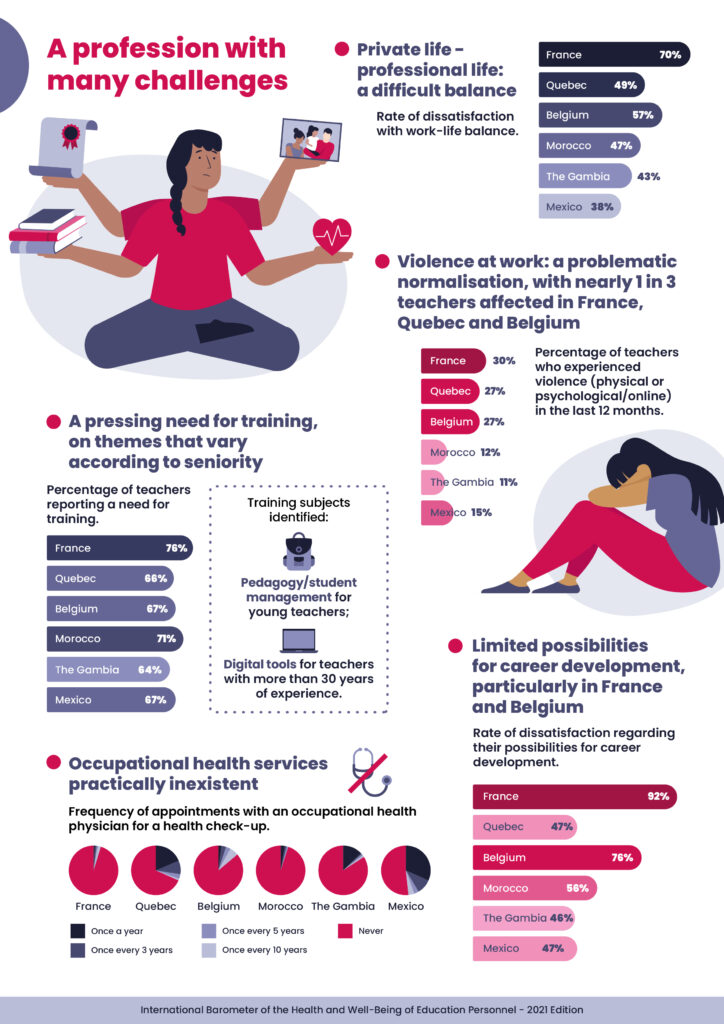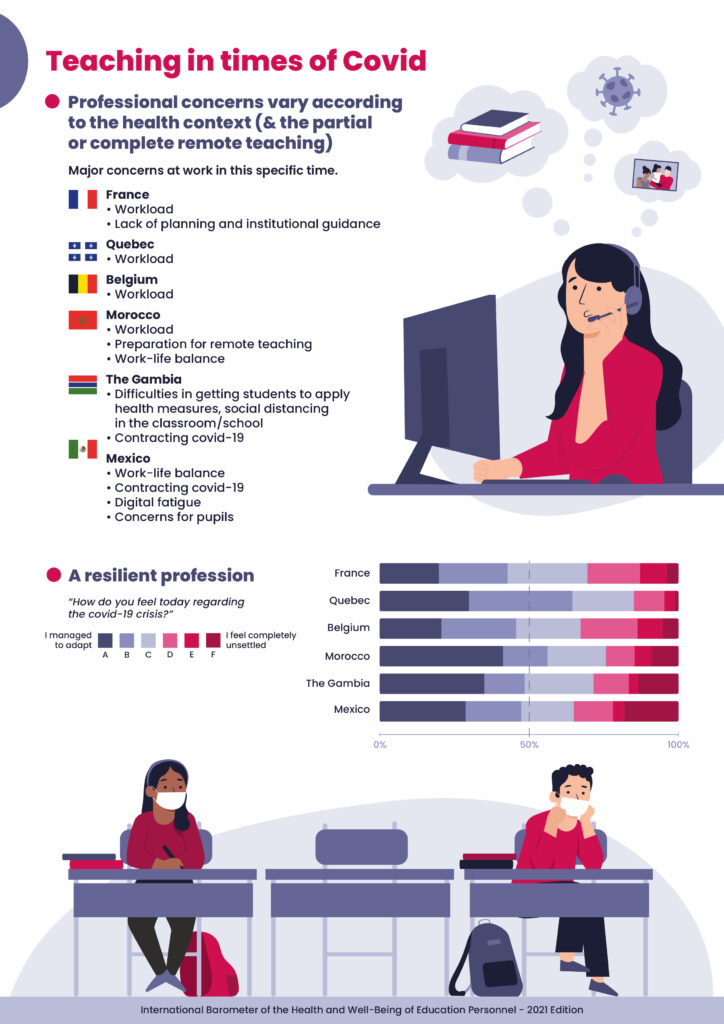The first edition of the International Barometer on Education Personnel’s Health and Well-being, based on a survey of 8,000 teachers in six countries on three continents, offers a unique insight into the experiences of teachers in 2021. By analysing issues related to their working conditions, their feelings about their profession and their well-being, the Barometer aims to support national and international policies to promote the health and well-being of educational communities worldwide.
The survey highlights the worrying trivialisation of school violence, as well as a lack of relevant training, of development prospects and of support from the hierarchy. While general health appears to be preserved, illustrating the resilience of the profession, the psychological health of teachers does nonetheless appear to be weakened in some countries, probably as a result of the Covid-19 crisis.
The data was collected between May and July 2021 by means of an Internet questionnaire sent out by the Education and Solidarity Network and its partners, to teachers from six different countries: French-speaking Belgium, France, Quebec, Mexico, Morocco and Gambia. The MGEN Foundation for Public Health carried out the statistical analysis of the answers received.
The statistics reveal a number of avenues for improvement that could be pursued to promote the well-being of teachers: more training and professional development opportunities, greater support from school leaders, higher salaries, but also better information on health and better occupational health.
How did the Covid-19 crisis affect education workers? How can we improve their occupational health?
As the International Barometer shows, at the end of the 2020/2021 school year, teachers around the world have been stretched to their limits. However, there are many different situations, linked to different local realities, whether socio-economic, cultural or circumstantial (end of school year, health situation, teleworking or not…).
The results suggest that the Covid-19 crisis has not only disrupted work/life balance but has also exacerbated pre-existing problems in the teaching profession. This is highlighted by a sense of imbalance between the efforts made by staff and the recognition received in terms of pay, professional development, promotion and security.
“The pandemic is a powerful reminder that the dedication and commitment of education personnel are assets that must be nurtured. Their health and well-being are fundamental to ensuring quality education,” says Matthias Savignac, President of MGEN and President of the Education and Solidarity Network. “By bringing together the views and perspectives of international health, education and research actors, and by regularly repeating the surveys to monitor the evolution of the health of education personnel over the years, the Barometer aims to be a long-term tool to support the well-being of education communities,” he adds.
All the results:
- Summary of results
- International report
- International Infographics
- Infographics France, Quebec, Belgium, Morocco, Gambia, Mexico
- Reports France, Quebec, Belgium, Morocco, Gambia, Mexico
Webinar to present the results
The Education and Solidarity Network and Education International organized an online forum to discuss the results of the Barometer on 18 November.
Moderated by Aurélie Djavadi (The Conversation, France), the online meeting provided a space for exchange and reflection on the main findings of the survey, and ways to support the well-being of education personnel at national and international levels. After the presentation of the results, participants interacted with several experts in education and health, including Andy Hargreaves and Dennis Shirley (co-authors of Well-Being in Schools: Three Forces That Will Uplift Your Students in a Volatile World), and Haldis Holst (Education International).




About the Education and Solidarity Network
The Education and Solidarity Network is an international association, created in 2009 by MGEN, Education International and the International Association of Mutual Benefit Societies (AIM). The objective of the Education and Solidarity Network is to build bridges between education and health actors in order to work for the health, well-being and social protection of educational communities around the world. The Education and Solidarity Network brings together 45 member organisations on five continents: health mutuals, education unions, and other organisations from the Social and Solidarity Economy and civil society. For more information: www.educationsolidarite.org
About the MGEN Public Health Foundation
The MGEN Public Health Foundation aims to identify ways of promoting the health of populations. It has a multidisciplinary team, which carries out scientific studies and research by organising its work around six research themes: innovation in health, health economics, health and work, cognitive and functional ageing, prevention and health promotion policies, and health and the environment. For more information: www.fondationmgen.fr
About Education International
Education International (EI) is the Global Union Federation that brings together organisations of teachers and other education employees from across the world. Through its 383 member organisations, it represents more than 32 million teachers and education support personnel in 178 countries and territories. For more information: https://www.ei-ie.org/en




